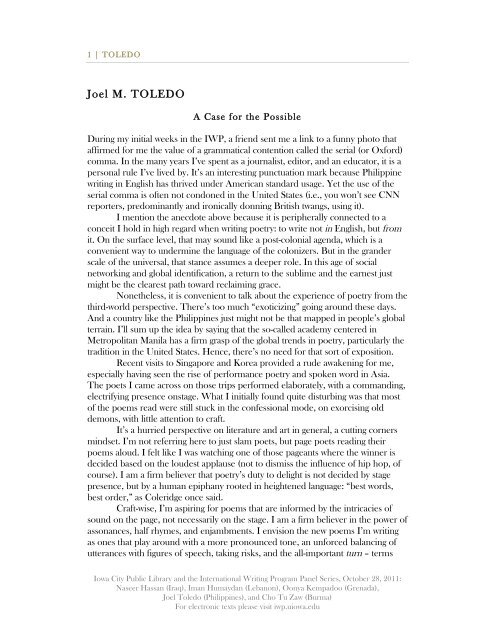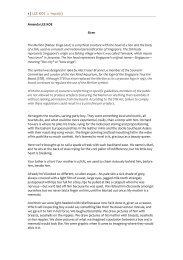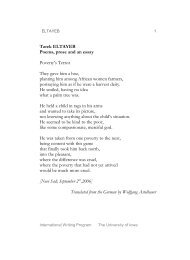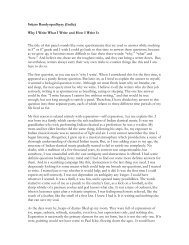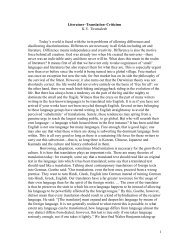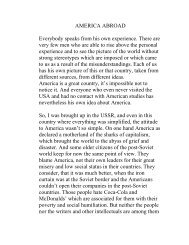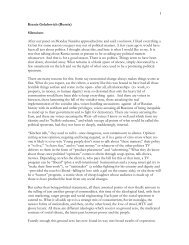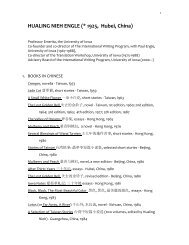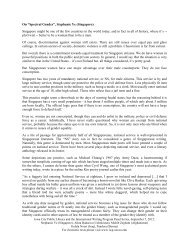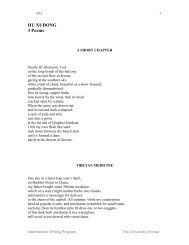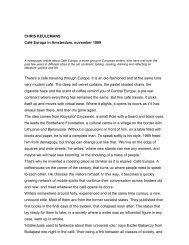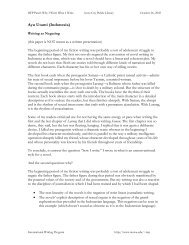Joel M. TOLEDO - International Writing Program
Joel M. TOLEDO - International Writing Program
Joel M. TOLEDO - International Writing Program
Create successful ePaper yourself
Turn your PDF publications into a flip-book with our unique Google optimized e-Paper software.
1 | <strong>TOLEDO</strong><br />
<strong>Joel</strong> M. <strong>TOLEDO</strong><br />
A Case for the Possible <br />
During my initial weeks in the IWP, a friend sent me a link to a funny photo that<br />
affirmed for me the value of a grammatical contention called the serial (or Oxford)<br />
comma. In the many years I’ve spent as a journalist, editor, and an educator, it is a<br />
personal rule I’ve lived by. It’s an interesting punctuation mark because Philippine<br />
writing in English has thrived under American standard usage. Yet the use of the<br />
serial comma is often not condoned in the United States (i.e., you won’t see CNN<br />
reporters, predominantly and ironically donning British twangs, using it). <br />
I mention the anecdote above because it is peripherally connected to a<br />
conceit I hold in high regard when writing poetry: to write not in English, but from<br />
it. On the surface level, that may sound like a post-colonial agenda, which is a<br />
convenient way to undermine the language of the colonizers. But in the grander<br />
scale of the universal, that stance assumes a deeper role. In this age of social<br />
networking and global identification, a return to the sublime and the earnest just<br />
might be the clearest path toward reclaiming grace.<br />
Nonetheless, it is convenient to talk about the experience of poetry from the<br />
third-world perspective. There’s too much “exoticizing” going around these days.<br />
And a country like the Philippines just might not be that mapped in people’s global<br />
terrain. I’ll sum up the idea by saying that the so-called academy centered in<br />
Metropolitan Manila has a firm grasp of the global trends in poetry, particularly the<br />
tradition in the United States. Hence, there’s no need for that sort of exposition. <br />
Recent visits to Singapore and Korea provided a rude awakening for me,<br />
especially having seen the rise of performance poetry and spoken word in Asia.<br />
The poets I came across on those trips performed elaborately, with a commanding,<br />
electrifying presence onstage. What I initially found quite disturbing was that most<br />
of the poems read were still stuck in the confessional mode, on exorcising old<br />
demons, with little attention to craft.<br />
It’s a hurried perspective on literature and art in general, a cutting corners<br />
mindset. I’m not referring here to just slam poets, but page poets reading their<br />
poems aloud. I felt like I was watching one of those pageants where the winner is<br />
decided based on the loudest applause (not to dismiss the influence of hip hop, of<br />
course). I am a firm believer that poetry’s duty to delight is not decided by stage<br />
presence, but by a human epiphany rooted in heightened language: “best words,<br />
best order,” as Coleridge once said.<br />
Craft-wise, I’m aspiring for poems that are informed by the intricacies of<br />
sound on the page, not necessarily on the stage. I am a firm believer in the power of<br />
assonances, half rhymes, and enjambments. I envision the new poems I’m writing<br />
as ones that play around with a more pronounced tone, an unforced balancing of<br />
utterances with figures of speech, taking risks, and the all-important turn – terms<br />
Iowa City Public Library and the <strong>International</strong> <strong>Writing</strong> <strong>Program</strong> Panel Series, October 28, 2011:<br />
Naseer Hassan (Iraq), Iman Humaydan (Lebanon), Oonya Kempadoo (Grenada),<br />
<strong>Joel</strong> Toledo (Philippines), and Cho Tu Zaw (Burma)<br />
For electronic texts please visit iwp.uiowa.edu
2 | <strong>TOLEDO</strong><br />
which I now find most crucial in giving the experience of reading any poem more<br />
depth, beyond the simple extended metaphor mode. <br />
In respectful but contentious response to a paper presented by a fellow<br />
resident a couple of weeks ago, I maintain that writers are never born writers; they<br />
are made. The other arts are more accommodating to the young. But no writer is<br />
good at writing at, let’s say, ten years of age. The inclination to write might be<br />
bolstered by the conduciveness of one’s growing-up environment, yes, but it takes<br />
real life experiences and a lot of emotional fermentation to gain poise and sense in<br />
writing. For example, I grew up in a barrio with no electricity until I was around<br />
twelve years old and then only had it because we needed light for my grandmother’s<br />
wake. There is nothing conducive in that.<br />
Poetry must trickle down to the masses if it’s to really matter. This is an<br />
important clause, though one that’s often perceived as bordering on the cavalier.<br />
Because care for language must never be a casualty in the process. Immediacy and<br />
the instant seem to be all the rage these days. We should re-learn waiting, value<br />
patience when reading or writing poems. People, even fellow writers, detest poetry<br />
because they don’t understand it. We’ve been raised thinking it’s an elaborate<br />
riddle with an equally elaborate punch line. So if we don’t get the insight or get<br />
stuck in the difficult vocabulary, we feel like we’re wearing the proverbial dunce<br />
cap.<br />
Every semester I tell my students that our motto in my literature classes is to<br />
read the lines before reading between the lines. The humanizing virtue of a poem is<br />
in the care given to its crafting, not in emotional outbursts. Because to the untrained<br />
reader, language itself – the building block of all literature – becomes the greatest<br />
inhibitor, a bump on the road that delays the so-called affect.<br />
Herein lies the seeming dilemma. What should be of primacy Affect or<br />
effect Aesthetics or content The answer is not as non-negotiable as many might<br />
think. It’s in one’s firm acceptance of a basic tenet in poetry: the multiplicity and<br />
subjectivity of meaning, the sharing of both the literal and the figurative. Of all<br />
literature, poetry alone demands nothing less than this intertwining.<br />
Instinct is of constant primacy, and form and matter should be unified to<br />
make for fine crafting. Otherwise all will just be about the clever and the witty (now<br />
trending; wit in poetry must always remain unassuming, sublimated). When I write<br />
my poems, I do not begin with an agenda or a plot. Instead I settle with peripheral<br />
patches of speech: a word, a phrase, a line. And, in some cases, a punctuation<br />
mark. I like to think that writing is dreaming on the page.<br />
I believe that good poetry blurs the line between the denotative and<br />
connotative, the image and the symbol, the effective and the affective, the craft and<br />
the art. At the end of the day, poetry wants to be generous, not difficult. It’s not<br />
about the truth, but what could pass for truth. So that the reader who is open to<br />
poetry may say, “Hey, this poem rings true; this feels real.” There’s no math, no<br />
science, required in that kind of realization.<br />
Iowa City Public Library and the <strong>International</strong> <strong>Writing</strong> <strong>Program</strong> Panel Series, October 28, 2011:<br />
Naseer Hassan (Iraq), Iman Humaydan (Lebanon), Oonya Kempadoo (Grenada),<br />
<strong>Joel</strong> Toledo (Philippines), and Cho Tu Zaw (Burma)<br />
For electronic texts please visit iwp.uiowa.edu
3 | <strong>TOLEDO</strong><br />
All in all, reading and writing poetry is neither easy nor convenient. But it is<br />
a way of trying to pray. Because it trains its eye then fixes its gaze on the possible –<br />
in language, in form, in insight. Because its grander duty is not to systematically<br />
(and often academically) polarize, but to naturally pluralize and humanize so that<br />
we can stare again at our scarred hearts without flinching.<br />
Iowa City Public Library and the <strong>International</strong> <strong>Writing</strong> <strong>Program</strong> Panel Series, October 28, 2011:<br />
Naseer Hassan (Iraq), Iman Humaydan (Lebanon), Oonya Kempadoo (Grenada),<br />
<strong>Joel</strong> Toledo (Philippines), and Cho Tu Zaw (Burma)<br />
For electronic texts please visit iwp.uiowa.edu


